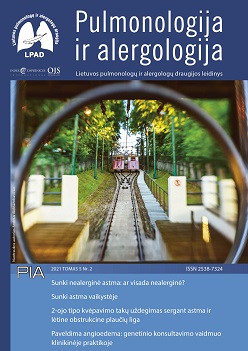HEREDITARY ANGIOEDEMA: PATHOGENESIS, DIAGNOSIS AND THE ROLE OF GENETIC COUNSELLING IN CLINICAL SETTING
Abstract
Hereditary angioedema (HAE) is a rare inherited disease characterized by recurrent episodes of swelling of the subcutaneous or submucosal tissues due to vasodilation and increased capillary permeability. Commonly affected areas are the skin of the face and limbs, gastrointestinal tract, and respiratory tract. Laryngeal edema – a life threatening complication may develop. The disease is classified into three types and smaller subtypes. Several genes that are involved in the development of HAE have been identified. The emergence of next-generation sequencing tests for use in the clinical setting has led to an increase in its application in diagnostics and care for HAE patients. A better understanding of the causes, clinical presentation, and diagnosis of HAE may improve the course of the disease. The aim of this article is to review the epidemiology, classification, pathogenesis, clinical presentation, and diagnosis of HAE with an emphasis on genetics.


